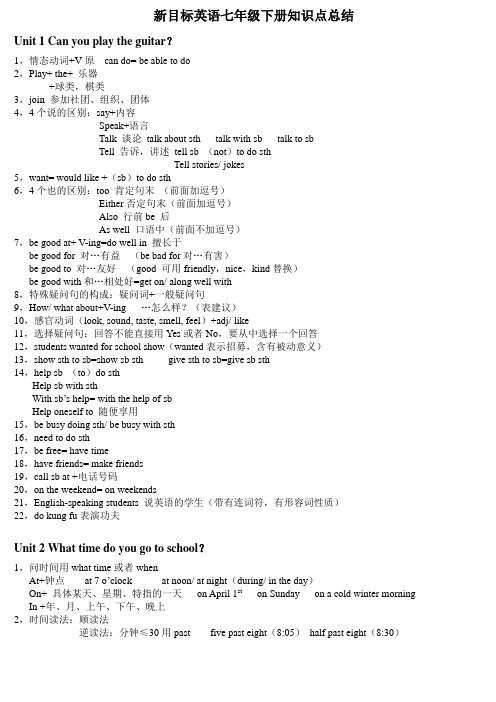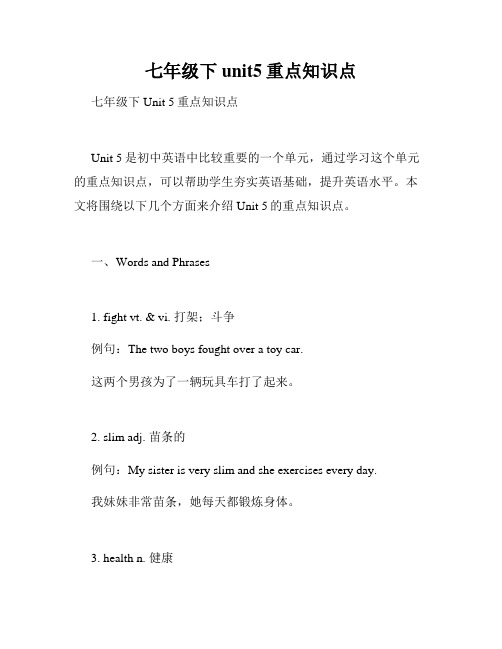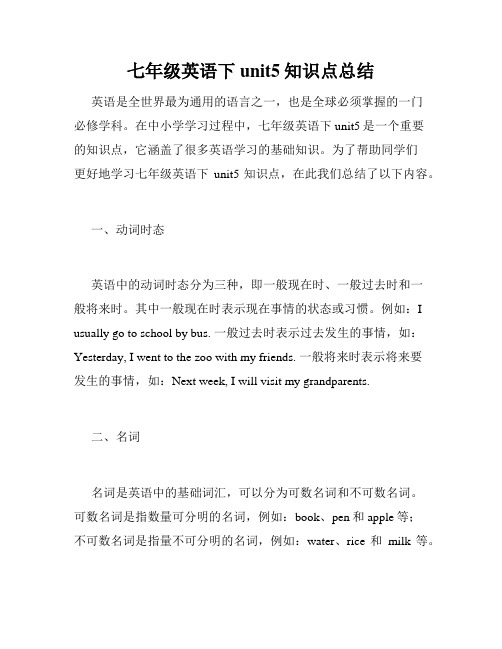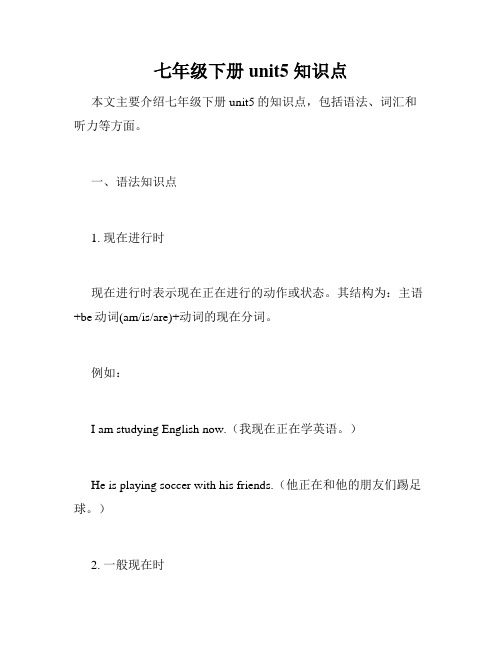(完整版)新版新目标英语七年级下册unit5知识点总结
七年级英语下册 Unit 5 Why do you like pandas知识点总结+导学案(无答案)(新版)人教新目标版

Unit 5 Why do you like pandas? 知识点总结归纳【短语归纳】1. kind of 有几分,有点儿2. be from / come from 来自于3. South Africa 南非4. all day 整天5. for a long time 很长时间6. get lost 迷路7. places with food and water 有食物和水的地方8. cut down 砍倒 9.a lot 非常;很多10.be in (great) danger 处于(极大)危险之中11. twelve years old 十二岁12. things made of ivory 由象牙制成的东西13. walk on two legs 用两条腿走路14. a symbol of 一个……的象征15.kill... of... 为……而杀死……16. lose one’s home 失去某人的家园【用法集萃】1. —Why...? 为什么……?—Because... 因为…….2. let sb. do sth. 让某人做某事3.want to do sth. 想要做某事4. one of + 名词复数……之一5. forget to do sth. 忘记要做某事6. forget doing sth. 忘记做过某事7. help sb. (to) do sth. 帮助某人做某事8. be friendly to sb. 对某人友好9. Where + be + 主语 + from? ……来自哪里?10. What animals do/does + 主语 + like?……喜欢什么动物?11.否定疑问句:Isn’t she ...?难道她不……吗?12. 数词 +year(s) old ……岁?【句子】1. WELCOME TO THE ZOO 欢迎光临动物园2. He can walk on two legs.他(指“狗”)会用两条腿走路。
七年级下册英语知识点复习(完整版)

新目标英语七年级下册知识点总结Unit 1 Can you play the guitar?1,情态动词+V原can do= be able to do2,Play+ the+ 乐器+球类,棋类3,join 参加社团、组织、团体4,4个说的区别:say+内容Speak+语言Talk 谈论talk about sth talk with sb talk to sbTell 告诉,讲述tell sb (not)to do sthTell stories/ jokes5,want= would like +(sb)to do sth6,4个也的区别:too 肯定句末(前面加逗号)Either否定句末(前面加逗号)Also 行前be 后As well 口语中(前面不加逗号)7,be good at+ V-ing=do well in 擅长于be good for 对…有益(be bad for对…有害)be good to 对…友好(good 可用friendly,nice,kind替换)be good with和…相处好=get on/ along well with8,特殊疑问句的构成:疑问词+一般疑问句9,How/ what about+V-ing …怎么样?(表建议)10,感官动词(look, sound, taste, smell, feel)+adj/ like11,选择疑问句:回答不能直接用Yes或者No,要从中选择一个回答12,students wanted for school show(wanted表示招募,含有被动意义)13,show sth to sb=show sb sth give sth to sb=give sb sth14,help sb (to)do sthHelp sb with sthWith sb’s help= with the help of sbHelp oneself to 随便享用15,be busy doing sth/ be busy with sth16,need to do sth17,be free= have time18,have friends= make friends19,call sb at +电话号码20,on the weekend= on weekends21,English-speaking students 说英语的学生(带有连词符,有形容词性质)22,do kung fu表演功夫Unit 2 What time do you go to school?1,问时间用what time或者whenAt+钟点at 7 o’clock at noon/ at night(during/ in the day)On+ 具体某天、星期、特指的一天on April 1st on Sunday on a cold winter morning In +年、月、上午、下午、晚上2,时间读法:顺读法逆读法:分钟≤30用past five past eight(8:05)half past eight(8:30)分钟>30用to a quarter to ten(9:45)整点用…o’clock 7 o’clock(7:00)3,3个穿的区别:wear 表状态,接服装、手套、眼镜、香水等Put on 表动作,接服装Dress 表动作,接sb/ oneself get dressed穿衣3,感叹句:How+adj+主谓!How+adj+a/an +n单+主谓!What+ a/an +adj+ n单+主谓!What+ adj+ n复/ 不可数+主谓!4,from…to…5,be/ arrive late for6,频度副词(行前be 后)Always usually often sometimes seldom hardly never7,一段时间前面要用介词for for half an hour for five minutes8,eat/ have…for breakfast/ lunch/ dinner/ supper9,either…or10,a lot of=lots of11,it is +adj+for sb +to do sth (adj修饰to do sth)It is important for me to learn English.it is +adj+of sb +to do sth (adj修饰sb)It is kind/ friendly/ nice of you to help me.Unit 3 How do you get to school?1,疑问词How 如何(方式)how long 多长(时间)答语常用“(For/ about +)时间段”how far多远(距离)答语常用“(It’s +)数词 +miles/ meters/ kilometers”how often多久一次(频率)答语常用“Always/ often/ every day/…”或“次数+时间”等表频率的状语How soon多快,多久以后,常用在将来时中。
七年级下册unit5知识点总结

七年级下册unit5知识点总结七年级下册Unit 5知识点总结七年级下册的Unit 5主要讲了“Would you like to travel?”这一话题,涵盖了许多与旅行相关的知识。
本文将对该单元的知识点进行总结。
一、词汇1. travel:旅行2. destination:目的地3. accommodation:住宿4. transportation:交通工具5. itinerary:旅行计划6. souvenir:纪念品7. guidebook:旅游指南8. language:语言二、句型1. Would you like to travel to...?“Would you like to...?”是询问对方是否想要做某事的常用句型,用来询问对方是否对某个旅行目的地感兴趣。
例如:Would you like to travel to Japan?2. Yes, I’d love to.“Yes, I’d love to.” 是肯定对方提议的常用回答,表示愿意去。
例如:A: Would you like to go to the beach this weekend?B: Yes, I’d love to.3. How long are you staying?“How long are you staying?”用来询问对方在某个地方待多久。
例如:A: How long are you staying in Shanghai?B: I’m staying for three days.4. What’s your itinerary?“What’s your itinerary?”用来询问对方的旅行计划。
例如:A: What’s your itinerary for your trip to Paris?B: I’m going to visit the Eiffel Tower and the Louvre Museum.5. What’s the best way to get to...?“What’s the best way to get to...?”用来询问前往某个地方的最佳交通方式。
七年级下unit5重点知识点

七年级下unit5重点知识点七年级下Unit 5重点知识点Unit 5是初中英语中比较重要的一个单元,通过学习这个单元的重点知识点,可以帮助学生夯实英语基础,提升英语水平。
本文将围绕以下几个方面来介绍Unit 5的重点知识点。
一、Words and Phrases1. fight vt. & vi. 打架;斗争例句:The two boys fought over a toy car.这两个男孩为了一辆玩具车打了起来。
2. slim adj. 苗条的例句:My sister is very slim and she exercises every day.我妹妹非常苗条,她每天都锻炼身体。
3. health n. 健康例句:Everyone should pay attention to their health and exercise regularly.每个人都应该注意自己的健康,定期锻炼身体。
4. member n. 成员例句:He is a member of the school basketball team.他是学校篮球队的一员。
5. agree vi. & vt. 同意例句:I agree with you that we should study hard for the coming exam.我同意你的观点,我们应该为即将到来的考试好好学习。
6. belong vi. 属于例句:This book belongs to me.这本书是我的。
7. knock vt.&vi. 敲击例句:He knocked on the door but no one answered.他敲门,但是没有人回答。
8. ring vt.&vi. 铃响例句:The phone is ringing. Can you answer it?电话响了,你能接一下吗?9. take vt. 拿;带走例句:Please take your bag with you when you leave.请你离开时带上你的包。
七年级英语下unit5知识点总结

七年级英语下unit5知识点总结英语是全世界最为通用的语言之一,也是全球必须掌握的一门必修学科。
在中小学学习过程中,七年级英语下unit5是一个重要的知识点,它涵盖了很多英语学习的基础知识。
为了帮助同学们更好地学习七年级英语下unit5知识点,在此我们总结了以下内容。
一、动词时态英语中的动词时态分为三种,即一般现在时、一般过去时和一般将来时。
其中一般现在时表示现在事情的状态或习惯。
例如:I usually go to school by bus. 一般过去时表示过去发生的事情,如:Yesterday, I went to the zoo with my friends. 一般将来时表示将来要发生的事情,如:Next week, I will visit my grandparents.二、名词名词是英语中的基础词汇,可以分为可数名词和不可数名词。
可数名词是指数量可分明的名词,例如:book、pen和apple等;不可数名词是指量不可分明的名词,例如:water、rice和milk等。
在英语中,名词有单数和复数两种形式,根据单数和复数形式的不同,其变换方式也各有不同。
三、冠词英语中的冠词分为定冠词和不定冠词,定冠词是指唯一的或已知的事物,如:the book、the pen等;不定冠词是指没有具体指定的事物,如:a book、an apple等。
在具体使用中,要考虑词汇的前缀和音素等因素做出适当选择。
四、代词代词是指用来代替名词或名词短语的词汇,常见的代词有人称代词、指示代词、反身代词和不定代词等。
人称代词包括第一人称、第二人称和第三人称三种,如:I、you、he、she、it、we和they等。
五、形容词和副词形容词是用来修饰名词的词汇,如:beautiful、big、small等;副词则是用来修饰动词、形容词或其他副词的词汇,常用的副词有slowly、quickly、happily等。
在使用形容词和副词的时候,要注意它们的比较级和最高级的变换。
七年级下册unit5 知识点

七年级下册unit5 知识点本文主要介绍七年级下册unit5的知识点,包括语法、词汇和听力等方面。
一、语法知识点1. 现在进行时现在进行时表示现在正在进行的动作或状态。
其结构为:主语+be动词(am/is/are)+动词的现在分词。
例如:I am studying English now.(我现在正在学英语。
)He is playing soccer with his friends.(他正在和他的朋友们踢足球。
)2. 一般现在时一般现在时表示目前一直存在或经常发生的动作或状态。
其结构为:主语+动词原形。
例如:I usually go to bed at 10pm.(我通常在晚上10点睡觉。
)She loves reading books.(她喜欢读书。
)3. 一般过去时一般过去时表示过去发生的动作或状态。
其结构为:主语+动词的过去式。
例如:I watched a movie yesterday.(我昨天看了一场电影。
)He visited his grandparents last weekend.(他上周末去看望了他的祖父母。
)二、词汇知识点1. 数字数字在日常生活中非常重要,掌握数字的英文表达可以帮助我们更好地进行交流。
以下是一些常用的数字表达:- 1:one;- 2:two;- 3:three;- 4:four;- 5:five;- 6:six;- 7:seven;- 8:eight;- 9:nine;- 10:ten;- 11:eleven;- 12:twelve;- 13:thirteen;- 14:fourteen;- 15:fifteen;- 16:sixteen;- 17:seventeen;- 18:eighteen;- 19:nineteen;- 20:twenty。
2. 乘客交通工具在生活中我们经常使用各种交通工具,以下是一些常用的乘客交通工具的英文表达:- bus:公交车;- subway/metro:地铁;- taxi/cab:出租车;- train:火车;- plane:飞机;- bicycle/bike:自行车;- motorcycle/bike:摩托车;- car:汽车。
新目标(Go for it)版七年级英语下册各单元知识点总结
新目标(Go for it)版七年级英语下册各单元知识点总结人教版初一英语下册各单元知识点总结Unit 1 Can you play the guitar?一、 单词与词组表示“参加,加入”,此处指参加社团或组织,成为其中的成员。
Join the army 参军 join the NBA 加入美国篮球协会Join the art/sports/music/English/chess club 参加体育/音乐/英语/象棋俱乐部play soccer/ basketball/volleyball/football/tennis/badminton / 篮球 / 排球 /英式足球,美式橄榄球/网球/羽毛球)Be good at+ sth./doing sth. 擅长做某事Be good with sb 与…相处得好Be good to sb …友好=be friendly toBe good for 对…有好处特指某一次的动作;like doing sth. 强调经常性的爱好。
两者都表示喜讲故事 tell sb. sth. /to do sth. /not to do sth.告诉某人某事/不要做某帮助某人做某事Help yourself/sb. (to sth.)把某物(尤其是指食物,饮料等)拿给自己/某人e.g. Call Mr.Brown at 293-7742意思是“回家”,“到家”。
前面不加介词。
这里的home 是e.g. 1)When do you go home every day?你每天什么时候回家? 2)He drives home after work.他下班的开车回家。
3)She often does some shopping on his way home. 她经常在回家途中买些东西。
2. at home 表示静态概念。
意思是“在家”。
这里的home 是名词,表示具体地点。
七年级下英语unit5知识点总结
七年级下英语unit5知识点总结在七年级下英语unit5中,我们学习了一些重要的知识点,本篇文章将对这些知识点进行总结和归纳。
这些知识点主要涉及到语法、词汇、听说读写等方面的内容。
一、语法部分1. 一般现在时一般现在时表示经常或习惯性的动作、状态、真理等。
动词的变化为主语+动词原形。
例如:He often goes to school by bike.We always eat breakfast at 7 o'clock.2. 现在进行时现在进行时表示现在正在进行的动作。
动词的变化为主语+am/is/are+动词+ing。
例如:She is watching TV now.They are studying English at school.3. 形容词比较级和最高级形容词比较级和最高级分别表示两个或多个事物的比较和三个或三个以上事物的比较。
比较级的变化为形容词+er,最高级的变化为形容词+est。
例如:This book is more interesting than that one.Alice is the tallest girl in our class.二、词汇部分1. 动物本单元中,我们学习了一些动物的名称,如tiger(老虎)、panda(熊猫)、elephant(大象)等。
2. 食物本单元中,我们学习了一些食物的名称,如hamburger(汉堡包)、pizza(比萨饼)、hot dog(热狗)等。
3. 数字本单元中,我们学习了1-100之间的数字,并学习了如何表达时间和日期。
三、听说读写部分1. 听力在本单元中,我们进行了多次听力练习,包括听录音选单词、听录音选择应答语、听录音填空等。
这些练习有助于提高我们的听力理解能力。
2. 口语在本单元中,我们学习了如何用英语表达自己的观点、感受和交流。
我们进行了口语练习,如问答练习、角色扮演等,这些练习有助于提高我们的口语表达能力。
七年级下册英语u5知识点
七年级下册英语u5知识点七年级下册英语Unit 5知识点Unit 5是七年级下册英语课程中的一个重要单元,涵盖了很多实用的知识点。
本文将为大家详细介绍这些知识点,希望能够对同学们在学习英语时有所帮助。
一、动词的时态英语中的动词时态有三种:一般现在时、一般过去时和将来时。
一般现在时表示现在或者经常发生的事情,一般过去时表示过去发生的事情,将来时则表示将要发生的事情。
在学习时态时,还需要注意动词的变化形式。
例如,在一般现在时中,第三人称单数形式的动词要加上“s”或者“es”。
二、指示代词指示代词可以用来指示人或物在空间或时间上的位置,例如“this”和“that”等。
其中,“this”用来表示比较近的空间或时间位置,而“that”则用来表示比较远的位置。
此外,还有“these”和“those”等指示代词,用来表示复数。
三、名词所有格名词所有格用来表明某个名词所属的人或物。
当名词是单数时,通常在末尾加上“’s”表示所有格,如“Tom’s book”。
但如果名词已经以“s”结尾,则只需要在末尾加上一个“’”即可,如“David’ hat”。
当名词是复数时,则在末尾加上“s’”,如“the girls’ room”。
四、情态动词情态动词是用来表示可能性、能力、愿意等情感意义的动词,如“may”、“can”和“should”等。
这些动词的基本形式没有“s”或“es”的变化形式,并且后面跟着的动词是不加“to”的不定式形式。
五、被动语态被动语态是指主语是动词动作的承受者,而不是执行者。
被动语态的构成方式是“be+过去分词”,如“the book was lost”(这本书被丢失了)。
被动语态可以用来强调主语的重要性,也可以使句子更加清晰明了。
以上就是七年级下册英语Unit 5的主要知识点,仅供参考。
在实际学习中,同学们还需要不断地积累词汇,提高口语和写作能力。
希望大家能够加油,取得更好的成绩!。
人教版新目标go for it 七年级下册U5 单词拼写,课文填空和知识点总结梳理
人教版新目标七年级下册Unit 5 Why do you like pandas?单词拼写Unit 51.A cat has four l_________.2. Julie, please remember to buy me a pencil. Don’t f __________it.3. I want to live in a big h__________ with a garden4. He is very l ______and doesn’t want to do anything.5. Lions are from S ______Africa, and they are kind of scary.6. Gina is f __________to me. She helps me a lot.7. Our school is very big .The number of students in our school is o_____2,000.8. The flowers are b __________.I like them.9. The p ________are black and white. They are very cute.10. Elephants can walk for a long time and never get l_____.【答案】1.legs 2.forget 3.house zy 5.South 6.friendly 7.over 8.brilliant 9.pandas 10.lost七下Unit5课文填空Hello. We are students from Thailand, and we want to save the elephants. The elephant is one of Thailand’s 1 (symbol). Our 2 (one) flag 3 (have) a white elephant on it. This is a symbol of good luck.Elephants are smart animals. They can play soccer or music. They can also draw very 4 (good). People say that “an elephant never 5 (forget)”. Elephants can walk 6 a long time and never get lost. They can also remember places with food and water. This helps them to live.But elephants are in great 7 (dangerous). People cut down many trees so elephants are 8 (lose) their homes. People also kill elephants for their ivory. Today there are only about 3000 elephants(over 100,000 before). We must save the trees and not buy things 9 (make) of ivory. Remember that March 13th10 (be) Thai Elephant Day.Keys: symbols, first, had, well, forgets, for, danger, losing, made, is.Section A重点单词听,跟读下列单词1.panda n.熊猫2.zoo n.动物园3. tiger n.老虎4. elephant n.大象5. koala n.树袋熊;考拉6, lion n,狮子7. giraffe n.长颈鹿8. animal n.动物9. cute adj.可爱的;机灵的10. lazy adj.懒散的;懒惰的11. art adj.聪明的12. beautiful adj.美丽的;美好的13. scary adj.吓人的;恐怖的14. kind n.种类15. Australia n.澳大利亚16. south adj.南方的n.南;南方17. Africa n.非洲18. pet n.宠物19.leg n.腿20,cat n.猫21, sleep v.&n.睡觉听,并跟读下列单词变形1. panda- pandas(复数)2. giraffe- giraffes(复数)3. interest--interesting/ interested(形容词)4. kind of- a little(同义短语)5. sleep- sleeps(第三人称单数)6. be from- come from(同义短语)7. beauty- beautiful(形容词)重点短语听,并跟读下列短语1. all day整天2. black and white黑白的3.a lot非常;很4. let sb. do sth. 让某人做某事5. want to do sth.想做某事6. kind of稍微;有点儿7. South Africa南非8. really scary确实吓人9. walk on two legs用两条腿走路10. be from来自重点句型听,并跟读下列句子1.“咱们先看熊猫吧,我最喜欢熊猫了。
- 1、下载文档前请自行甄别文档内容的完整性,平台不提供额外的编辑、内容补充、找答案等附加服务。
- 2、"仅部分预览"的文档,不可在线预览部分如存在完整性等问题,可反馈申请退款(可完整预览的文档不适用该条件!)。
- 3、如文档侵犯您的权益,请联系客服反馈,我们会尽快为您处理(人工客服工作时间:9:00-18:30)。
Unit 5 why do you like pandas?Section A1. Let’s see the pandas first. Let’s = Let us(1)祈使句句型Let sb. do sth. 让某人做某事。
表示说话人的建议。
(2)肯定回答: OK / All right / Yes, let’s… / Good idea.否定回答: Sorry, I…Let’s go to the zoo to see the animals. 让我们去动物园看动物吧。
Sorry. I have no time. 对不起,我没时间。
All right. I like animals. 好的,我喜欢动物。
(3)其他提建议的句型a.Shall we do...? 我们做...好吗?b.Why don’t you do ...?=Why not do ...? 为什么不做某事呢?c.What/How about doing sth? 做某事怎么样?(4)让某人做某事:let sb do sth2.favorite=like best What’s one’s favorite...?=What ...does/do sb like best?3. Why do you want to see the lions? Because they’re cute.(1)由why提问的问句,要用because来回答(2) because 不能和so同时出现(3)why=what...for...? (4)Why do/does 主语+do+其他?4.want v(1) want sb to do something 想让某人做某事(2)want to do sth 想做某事(3) want to be ... 想成为(4)want sth 想要某物5.kind(1) n 种类,类型,类别a kind of 一种all kinds of = different kinds of各种各样的Bamboo is a kind of grass. 竹子是一种草。
There are all/different kinds of fruits in that store.(2)adj 和蔼的,亲切的be kind to sb 对...好(3)in kind 用实物(支付)Farmers often like to pay their bills in kind.农民往往愿用实物抵账。
(4)kind of = a little = a bit 有点,稍微, 有几分(修饰adj或adv),kind of 作状语I think pandas are kind of lazy.(修饰adj)我觉得熊猫有点懒。
This math problem is kind of / a little / a bit difficult to him. (修饰adj)这个数学题对他来说有点难。
He speaks kind of / a little / a bit fast.他说话有点快。
(修饰adv)(5)It’s kind of sb to do sth 某人做某事真是太好了6.like(1)v 喜欢A.like+名词/代词喜欢某人或某物Tom likes fish very much.汤姆非常喜欢鱼。
Mr Wang is a good teacher.We all like him. 王老师是个好老师,我们都喜欢他。
B. like to do sth. (偶尔或具体地)喜欢做某事偶尔一次的爱好=wantI like to swim with you today.今天我喜欢和你一起去游泳。
C. like doing sth. (经常或习惯地)喜欢做某事长期性的爱好.He likes singing.他喜欢唱歌。
D. like sb. to do sth.喜欢某人做某事She likes them to ask questions like this. 她喜欢他们像这样问问题。
E.would like to do sth. (=want to do sth.) 想要做某事I'd like to go shopping with you.我想要和你一起去买东西。
F.would like sb. to do sth.想要某人做某事I'd like you to meet my parents.我想要你见见我的父母亲。
(2) prepA.be like, look lik+名词或代词作宾语,像……;跟……一样What is he like? 他是怎么样的一个人?The little girl looks like her father.那个小姑娘看起来像她的父亲。
B.feel like+doing /代词或名词,想要做某事Do you feel like having a rest?你想休息吗?We'll go for a walk if you feel like it.如果你想散步,我们就去吧。
(3) 常见句型:A.What do you like about...?关于……你喜欢什么?,用来询问对方所喜欢的内容。
What do you like about China?你喜欢中国的什么?B.How do you like...?你认为……怎么样?(=What do you think of...?) 询问看法C.Would you like +名词/to do sth.?你想要……吗?询问对方是否需要什么或征求意见与看法。
Would you like some water?你想要一些水吗?Would you like to play football with us?你愿意和我们一起去踢足球吗?7. be from come from(1)be from 从什么地方来, 是什么地方人=come fromI come from China.= I am from China.(2)两者均可表示来自哪里.指明说话者的家乡。
come from 短暂动词,不和延续时间连用,be from 可以.(3)come from 还可表示从某个地方来,而be from 则不行.I came here from my uncle's .我从叔叔家来这的。
(4)Where be +主语+from? 某人来自哪里?某物产自哪里?8. sleep n. 睡眠Teenagers need 8 hours’ sleep a night.青少年每晚需要8小时的睡眠。
(1)sleep vi. 睡觉go to sleep 入睡=fall asleepDon’t sleep too late. It is bad for your health.(2)sleepy adj. 困的I am too sleepy to keep my eyes open.(3)asleep adj. 在睡觉(表语形容词)feel sleepy 感到困倦be asleep=be sleeping 睡着了Please be / keep quiet! The kids are asleep / are sleeping.(4) go to bed 上床睡觉强调上床的动作,但是不一定睡着与get up 相对sleep 睡觉睡着啊的全过程,强调睡眠的持续状态9.表示方位的词east , west, south , north n.东西南北+ern 变成形容词eastern, western, southern, northern adj.Section B1. friend n. friendly adj.友好的(1) make friends 交朋友(2) be friendly to sb. = be kind to sb. 对某人友好对别人的态度好,热情The teacher is friendly to the students. = The teacher is kind to the students.(3) be friendly with sb. 和某人关系友好两者的关系The children here are friendly with each other. 这里的孩子相互友爱。
2.名词+ly ==>形容词friendly 友好的brotherly 兄弟般的sisterly 姐妹般的motherly 母亲般的fatherly 父亲般的lovely 可爱的形容词+ly ==>副词sad sadly 伤心地clear clearly 清楚地beautiful beautifully 漂亮地careful carefully 细心地angry angrily 生气地happy happily 高兴地3.save one’s life 拯救某人的生命save 储存,储藏;节省,节约4.forget to do sth. 忘记去做某事(还没做)forget doing sth. 忘记曾经做过某事(已经做过)5. be in danger 处于危险中面临危险be out of danger 脱险脱离危险His life is in danger.=He is in danger of losing his life. 他有生命危险。
Firefighters are often in great danger.The person in hospital is out of danger.6.cut down 砍倒;消减,压缩,缩减cut up sth. 切碎某物cut down many trees 砍伐很多树木7. make(1) be made of … 由…… 制造能看出原材料(2) be made from … 由…… 制造不能看出原材料(3) be made in … 在哪里制造The boat is made of wood. 这条船是木头制造的。
The paper is made from wood.纸是木头做的。
This product is made in China. 这个产品是中国制造8. Isn’t he cute? 难道他不可爱吗?Yes, he is. / No, he isn’t. (注意对答语的翻译)否定疑问句: 带有惊异、赞美、反问、失望、责难等语气的句子。
难道……不……吗Don’t you know him? 难道你不认识他吗?Can’t you see it? 难道你看不见它吗?答语形式上与一般疑问句答语是一样的。
